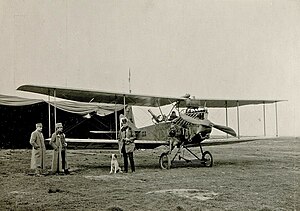Albatros B.I(Ph)
| Albatros B.I(Ph) | |
|---|---|

| |
| Role | Reconnaissance |
| Manufacturer | Phönix |
| First flight | Jan 1915 [1] |
| Introduction | March 1915 [1] |
| Primary user | |
| Number built | 115 [note 1] |
| Developed from | Albatros B.II |
| Wingspan | 12.8 m (42 ft) [2] |
| Engine | 145hp Hiero inline or 160hp Mercedes D.III inline (S22) |
| Armament | none or flexible rear MG (Series 22) |
| Max Speed | 110 km/h (68 mph) [3][note 2] |
| Climb | 1,000 m (3,280 ft) in 8:54 to 13:25, depending on series.[3] |
Thirty-one Albatros B.I(Ph) were ordered in August 1914 as Series 23. They were based on the German Albatros B.II except they were slightly larger and had changes to accommodate the 145hp Hiero engine. They were used by ten Fliks for reconnaissance until they could be replaced with newer planes starting in autumn 1915. After front-line service, they made an excellent trainer and served in that role through 1918. [1]
Series 24 saw fifty-three new aircraft built and twenty-nine conversions from older airframes. It featured reduced weight and a new radiator. Series 24 machines made it to the front lines in December 1915. Series 24.5 saw a new tapered wing profile intended for high-altitude flight, appearing in early 1916. In the summer of 1916 the series 24 planes started to be replaced by the Brandenburg C.I. [4]
Series 22 saw thirty-one new aeroplanes, identical to the Series 23 but using the 160hp Mercedes D.III, with deliveries starting in late summer of 1915. It had the best performance and allowed the addition of a gun for the observer. [5]
Timeline

Game Data
Wings of Glory
| Availability | Maneuver | Damage | Dmg Points | Max Alt. | Climb |
|---|---|---|---|---|---|
| 15Q2-16Q4 | XC | --- | 12 | 8? | 8 |
References
- Notes
- Citations
- Bibliography
- Peter M. Grosz, George Haddow, and Peter Schiemer. Austro-Hungarian Army Aircraft of World War One. Flying Machines Press, 1993. ISBN 0-9637110-0-8.
- W.M. Lamberton and E.F. Cheesman, Reconnaissance & Bomber Aircraft of the 1914-1918 War. Great Britain: Harleyford Publications Ltd., 1962. ISBN 9780900435027